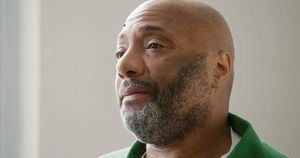Donald Trump, the former president, has found himself under heightened scrutiny following comments he made about Liz Cheney, the former congresswoman who was instrumental in the January 6 investigation. His remarks, which suggested Cheney should be facing gunfire, have sparked outrage and are now being investigated by Arizona authorities for potential criminal threats. This isn’t just another case of political mudslinging; officials are assessing whether Trump's statement was merely bluster or if it crosses the line legally.
The controversy erupted when Trump, during a recent rally, remarked, "Liz Cheney should be shot for her betrayal of the Republican party." While Trump insists his words were misinterpreted, critics outline the serious nature of such comments, especially considering Cheney's significant political background and current role as a target of Trump’s rhetoric. The Arizona attorney general's office is now examining whether these comments could be deemed as inciting violence, which carries significant legal ramifications.
Kamala Harris, the vice president, weighed in, stating, “These comments show how far Trump has moved away from conventional political discourse. It’s concerning and reveals his unhinged behavior.” Harris's condemnation of Trump's comments adds to the growing chorus of voices from both sides of the political aisle calling for accountability.
Political commentators are also chiming in, arguing this situation highlights the fraught relationship between Trump and Cheney. Once allies under the Republican banner, Cheney's fierce opposition to Trump, especially related to the Capitol riots and the January 6 absolutely rocked the party's foundations. Her subsequent defeat during the primary elections only fueled Trump's continued attacks.
While the investigation is currently focused on the legality of Trump’s comments, the broader issue is how political rhetoric continues to escalate and the potential consequences of such language. Legal analysts point out the challenges of prosecuting statements made in the heat of campaigning, where exaggeration is often par for the course.
Some analysts believe this investigation could set important precedents. Will it curb future incendiary political comments, or will it be seen as the government interfering with free speech? These are pressing questions as the 2024 election nears, and Trump's influence on the Republican Party remains significant.
Looking back at previous instances, one can see how rhetoric from political leaders can quickly shift from simple campaign statements to actions prompting investigations. This might not be the first time Trump has faced scrutiny for his words, but the legal inquiries extend beyond just him. This could impact several individuals who have spoken out against him since the January 6 insurrection.
The timing of this investigation couldn't be more pronounced. With election season heating up, the political climate is rife with potential confrontations and fierce exchanges of ideas. Many are waiting to see how this situation will play out not only for Trump but for the Republican Party as they navigate their own internal divides.
There could potentially be legal ramifications for Trump; Arizona prosecutors are deliberative about whether to bring charges or issue warnings about inciting violence. Their examination is indicative of growing concerns among leaders about the power of language and the rising tensions across the political spectrum.
What is clear is this situation opens the floodgates to discussions around political rhetoric and its consequences. Many Americans are engaging more deeply with issues of how words translate to real-world actions. The investigation serves as yet another reminder of the volatile interplay between politics, law, and free speech.
Meanwhile, Trump's campaign continues to push back against what they view as political attacks rather than legitimate concerns. It remains to be seen how this will affect his standing with voters leading up to the elections.
Given the gravity of the comments and the ensuing investigation, it appears unlikely this issue will fade quickly. Whether it will affect formal campaigning strategies or Trump's approach to rallies is yet to be determined as the dynamics of the political scene shift.
What emerges from this scenario is not just about Donald Trump or Liz Cheney, but about the changing face of political dialogue and what it means for future political discourse. Voters are becoming increasingly aware of their leaders' words and the potential consequences behind them. This case might serve as both a cautionary tale for politicians and a point of awakening for constituents.
Overall, as the winds of political change continue to swirl around, the importance of maintaining respect and considering the impact of one's words will surely stay front and center. The investigations and fallout from this incident could ripple through the Republican party and beyond.



